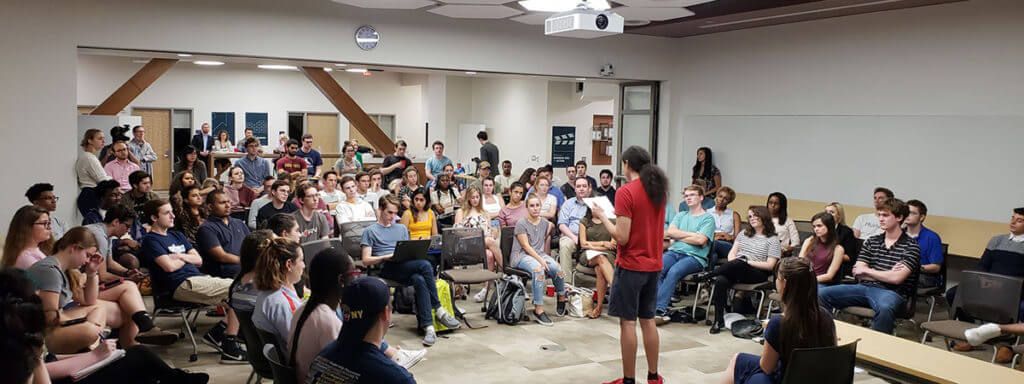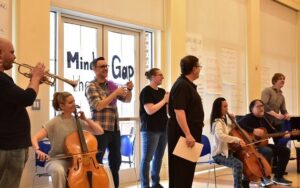I recently had the pleasure of participating in a Braver Angels Debate event in Santa Monica, California, and wanted to offer my insights into the process and how that may or may not feed into BA’s mission of depolarization. The particular debate topic was posited in the affirmative: To abolish the Electoral College system of presidential voting in favor of a national popular vote.
As explained by the chairperson of the format, a BA debate differs from the standard formal debate format in that the end result seeks neither a clear winner or loser between two teams nor a result that converges on a joint resolution. Rather, it is like a forum where different opinions on an issue can be addressed and expressed. The emphasis is on inclusion of different viewpoints and a balance between red vs. blue perspectives.
After three hours of discussion it appeared that many viewpoints had been included and expressed. However, I had a distinct feeling that participants left the meeting with the same firm opinions on which they arrived, with blues thinking the EC is undemocratic and disenfranchising, and reds thinking we don’t have a democracy, we have a republic.
Neither of these positions is completely wrong, nor is either completely right; but my impression is that the necessary convergence on what is correct or incorrect about subjective opinions was never really addressed. From how I read BA’s literature, this is the intended result: BA is not about changing minds, it’s about listening to different dialogues. I can agree with this, but I wonder if we really need to do more in order to depolarize politics.
BA has been compared to marriage counseling, and I believe this is an accurate analogy. Marriage counseling is primarily about getting the two parties to affirm their different perspectives on the nature of their partnership. By definition these perspectives are subjective and serve to affirm one’s identity through differing points of view.
My concern is whether this strategy is as productive in politics. Politics is about reconciling differences and converging on a plan of action. And we must do this at scale. Even if this process is successful, a large number of participants are not going to get their opinions or preferences affirmed. If a marriage faced that prospect, the better alternative might be an amicable divorce. So, the challenge in politics is: how does one promote compromise in the spirit of give-and-take in order to converge on actions that satisfice the demands of self-government? (Satisfice is a term that bridges “satisfy” with “suffice;” a synonym is probably “the best we can do.”)
I would argue, then, that disagreement is the essence of democratic politics– if we had no differences, there would be no need for politics. We don’t really deal with disagreement when we retreat into our partisan identities, which may also coincide with our biological identities. The purpose of political dialogue is not for us to change peoples’ minds, but for us to offer them the prospect of and reason for changing their own minds voluntarily. The tragedy of polarization is that we have shut down the channels that can lead to this convergence.
My view of the BA debate forum is that, intentionally or unintentionally, it reinforces this barrier to convergence. This can be explained best through the actual debate that took place. First off, though BA seeks a 50-50 balance between reds and blues, it appeared that about 80% of the participants were opposed to the resolution, even if they thought there were needed reforms to the electoral system. The problem, then, was how to balance the inclusion of affirmative and negative speakers. This was solved simply: those individuals speaking in the affirmative received four times as many speaking turns as those individuals speaking in the negative, for dearth of voices. What this accomplished was to diffuse the issue into many different directions, in other words, diverging instead of converging.
The second problem I observed was that the format impeded rebuttals to specific subjective opinions, whether from one side or the other. The net result is that this privileged the arguments of speakers who had more time to make those arguments. Opposing points of views and challenges to those arguments were then diffused, or never got a chance to be voiced. This was unfortunate, because it detracted from the deeper issues about democracy and elections, which are not so clear-cut.
I’ve heard enough discussion about the Electoral College to recognize how the issue has been propagandized in the media, from both sides. My point is that as citizens, we must be able to cut through this propaganda by challenging our thinking issue by issue. BA debates seem to want to avoid these challenges to our thinking, or defer them. The apparent reason is to discourage personal confrontations among friends and peers, but as adults we should be able to accept that some of our heartfelt ideas may be wrong.
In assessing our politics, I would maintain that our present dysfunction is not primarily the fault of the electoral system, the occupant of the Oval Office, or the constitutional structure of our legislature. Rather it is a failure of our political culture, due to certain forces pulling us apart instead of pulling us together as a society. These forces—the political parties (through campaigning, legislating, and gerrymandering,) news and entertainment media (conflict sells,) and elite manipulation (corporate lobbying, regulatory capture, anti-competitiveness)—act in the narrow interest of accumulating greater power, wealth, and influence over the world. Using successful divide-and-conquer strategies, they exhibit anti-democratic tendencies, and operate in ways detrimental to the interests of the broader political community. The framers of our constitution, fearing this kind of centralization, designed our political system to create a very decentralized structure of competing interests, in which none could dominate the way some do now.
That said, the digital Information Age is fundamentally different than the agrarian and industrial ages that preceded it. We engage differently as a society, information has become a commodity, and we know both too much and too little about the complexities it has fostered. We are more connected on the superficial, yet more isolated on the meaningful, than ever before. The demands to manage these changes and adapt will continue to challenge us.
But the purpose of discussion, as for any debate on the issues, is not to manipulate political preferences or convince people to change their minds. Rather, it is to expose issues in a different light, and give people the option of changing their own minds in order to promote more successful politics that serves our needs as citizens. This relies more on objective reality and rational thinking than on subjective opinion.
I don’t engage in politics to affirm my beliefs, but to seek a greater truth. So we should tackle our differences in debate formats. I think we can handle that, at least I would hope so. That’s why I joined Braver Angels and attend its events, because the alternative seems to be to huddle in our own self-affirming bubbles watch the train-wreck in slow motion.
Michael Harrington is a political scientist, policy analyst, and writer living in Los Angeles. He has extensively researched the red-blue divide in American party politics by focusing on county level census and voting data. He blogs at www.casinocap.wordpress.com and www.tukaglobal.com.





2 thoughts on “A Mild, Sympathetic Critique of Braver Angels Debates”
Michael, you make a cogent argument and point out a weakness in the BA debate model that my partner state coordinator and I have discussed many times.
Do you have suggestions for how the BA debate process could be changed?
Michael — heard a recent speech given by Obama on Pluralism as part of his 2024 demonocracy forum that I think is an insightful view and an opportunity that I see as aligned and could be operationalized consistent with the Braver Angels ethos and mission.
See below for a summary on points made for reflection
Point Number One: Building bridges is not contrary to equality and social justice in fact, it is our best tool for delivering lasting change. Now today, there is a perception, among some advocates, that being adversarial is the main way to make change. Compromise and civility only serve to entrench existing power structures.
Pluralism is not about holding hands and singing “Kumbaya.” It is not about abandoning your convictions and folding when things get tough. It is about recognizing that in a democracy, power comes from forging alliances, and building coalitions, and making room in those coalitions not only for the woke but also for the waking. Now, there are risks involved in engaging with groups you disagree with, particularly if there’s a power imbalance involved. There is a risk when you begin to negotiate comprises that you’ll give away too much, that you’ll whittle away your issues to the point where it’s hard to claim that you’re making progress. And building bridges may require you to deal with people who not only disagree with you, but do not respect you.
Point Number Two: Pluralism does not require us to deny our unique identities or experiences, but it does require that we try to understand the identities and experiences of others and to look for common ground.
It may feel satisfying in the short term. Unfortunately, it actually reinforces the sense that we are inevitably, immutably divided and that makes it harder for people to reimagine how they might see themselves and they might see others. In order to build lasting majorities that support justice — not just for feeling good, not just for getting along, to deliver the goods — we have to be open to framing our issues, our causes, what we believe in in terms of “we” and not just “us” and “them.”
– We have to try to frame issues in ways that at least consider the possibility of a win/win situation, rather than a zero-sum situation.
Third Point: Pluralism works better when it is about action and not just words
Words alone do not build trust. Words alone do not rid people of prejudice. What does build trust, because it builds relationships, is people banding together to get stuff done. Whether it’s a mosque and a synagogue joining forces to help victims of a natural disaster, or a Black community linking up with a traditionally hostile white community in Chicago to try and stop a highway from running through both neighborhoods. Such common efforts take time. They require an investment on the part of the participants.
It won’t eradicate people’s prejudices, but it will remind people that they don’t have to agree on everything to at least agree on some things. And that there are some things we cannot do alone.
Final point: We are not born with the muscles to make pluralism a habit, it takes practice, and we need to rebuild the institutions that can give us that practice.
Which is why this may need to start by just looking for opportunities for people to once again become a part of a society of joiners. Create more organizations from elementary school all the way through adulthood, that bring people together to do something.
A lot of our best work will happen from the bottom up instead of the top-down. If we’re going to get better at pluralism, it’s going to happen in the neighborhoods, in the communities where we spend our time, and in the schools where our kids develop the skills and learn how to negotiate and work together across differences.
What happens when the other side has repeatedly and abundantly made clear they’re not interested in playing by the rules?” Even in those circumstances, it’s important to look for allies in unlikely places. Too often, we assume that people on the other side have monolithic views when, in reality, some of them may share our beliefs in sticking to the rules, observing norms, and that’s why, when it is appropriate, there is nothing wrong with reinforcing and lifting up elected officials or voters, your neighbors, your friends, who you may not disagree with anything but they do agree with you on that.
Building up these habits and practices that so often we’ve lost. Learning to trust each other again, that’s a generational project.
Younger generation: And what they’re discovering is that, when they apply the principles, we just talked about — when they listen, they recognize their multiple identities, seek out common experiences and common values — they’re not just strengthening democratic habits. They’re building stronger organizations, which means they can deliver better results, concrete results for their members.
That is the power of pluralism. That’s how we break this cycle of cynicism that’s so prevalent in our politics right now, and ultimately, that’s how we’re going to solve some of the greatest challenges of our time.